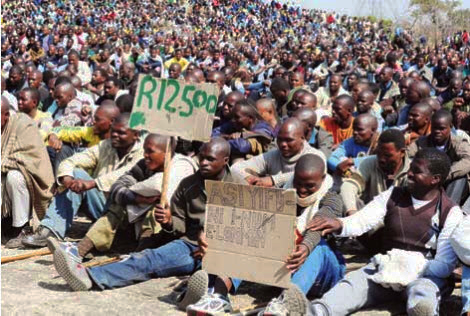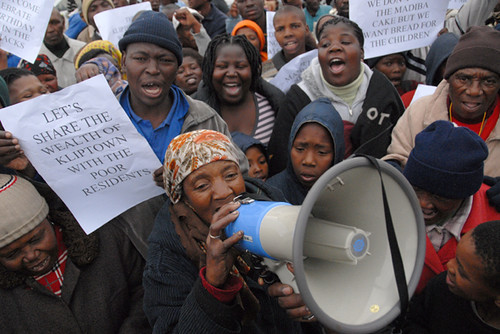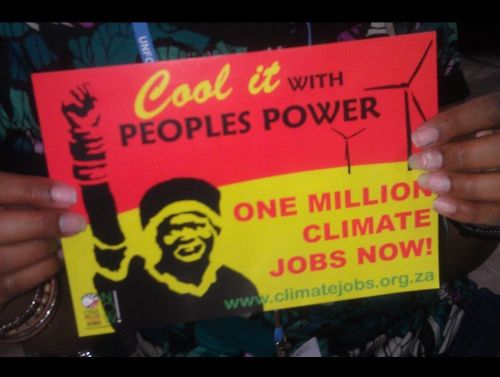COSATU
South Africa: Marikana massacre – a turning point?

Marikana mineworkers on strike for higher pay.
For more coverage of South Africa, click HERE.
By Martin Legassick
August 27, 2012 – Links International Journal of Socialist Renewal -- The massacre of 34, and almost certainly more, striking mineworkers at Marikana (together with more than 80 injured) on August 16 has sent waves of shock and anger across South Africa, rippling around the world. It could prove a decisive turning point in our country’s post-apartheid history.
Marikana is a town situated in barren veld, dry brown grass in the winter, with occasional rocky outcrops (kopjes, hillocks). The Lonmin-owned mines – there are three, Karee, West and East Platinum – are situated on the outskirts of the town. Alongside two of them is a settlement of zinc-walled shacks festooned with lines of washing called Enkanini, where most of the mineworkers live.
South Africa: 'Sorting fact from fiction at Marikana' -- Terry Bell on the massacre of mineworkers

For more coverage of South Africa, click HERE.
August 27, 2012 -- Terry Bell is a widely respected labour reporter and activist based in Cape Town, South Africa. His "Inside labour" columns in Amandla! magazine and on his blog, Terry Bell Writes, are essential reading for those interested in developments in South Africa's labour movement. Below, with Terry Bell's permission, Links International Journal of Socialist Renewal posts some of his recent columns dealing with Marikana massacre and the background to it.
* * *
By Terry Bell
August 23, 2012 -- Terry Bell Writes -- The deaths at Lonmin amount to the bloodiest tragedy of the post-apartheid era. As a result, the blame game is in full swing and is likely to continue in the weeks ahead.
South Africa: (updated Aug. 29) Justice now for the Marikana workers and community!

August 24, 2012 – In the aftermath of the t
South Africa: The massacre of our illusions … and the seeds of something new
By Leonard Gentle, director of the International Labour Research and Information Gro
South Africa: The ANC's 'second transition' to what?

By Vishwas Satgar, Johannesburg
July 13, 2012 -- Amandla! --The African National Congress (ANC), South Africa's ruling party for almost two decades, held a policy conference in June. There are many ideas and policy perspectives up for discussion but the "big idea" framing the discussion is captured in a 47-page long document entitled: The Second Transition? Building a National Democratic Society and the Balance of Forces in 2012.
COSATU general strike shakes South Africa

By Ashley Fataar, Cape Town
March 12, 2012 – Links International Journal of Socialist Renewal -- March 7 saw South Africa’s largest protest in several years when more than 200,000 workers took to the streets in 32 towns and cities across the country. More than 1.5 million workers stopped work.
The strike – called by the Congress of South African Trade Unions (COSATU) to protest against the growing role of labour brokers and the introduction of road tolls -- was prompted by worsening poverty and working conditions in South Africa. There has been a steady decline in the wage share of national income, down from 56% in 1996 to less than 47% today.
'Uneven and combined Marxism' within South Africa’s urban social movements

A protest by Kliptown Concerned Residents and the Anti Privatisation Forum.
1912-2012: African National Congress at 100

By John S. Saul
National Union of Metalworkers of South Africa: COP17 and class struggle
The National Union of Metalworkers of South Africa convened its first International Seminar on Climate Change and Clas
COSATU leader on South African and Israeli apartheid

Address by Zwelinzima Vavi, general secretary of
